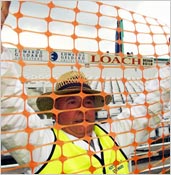Ground realities
Daniel Laidlaw
One day, international cricket will become a sport that can last a series or
tournament without some form of controversy or discontent confined directly
to the matches being played. It has to happen eventually. Doesn't it?
For the time being, the game lurches from one problem to the next but, more
disappointingly and in what is an indictment of those who govern it,
frequently treads over old ground and scandals. Most of the issues like
umpiring, dissent, throwing and even corruption are in no way original
problems. Pitch invasions by spectators are just the latest example.
England has a crowd control problem. Shambolic scenes have again been
witnessed in matches involving Pakistan in England. It cannot, or at least
definitely should not, be surprising to anyone. Measures were supposed to be
in place to prevent it prior to the NatWest series. After they failed
dismally in the opening match at Edgbaston, the England Cricket Board
revealed it was taking the issue "extremely seriously" and introduced a
range of superficial initiatives that were supposed to combat the problem.
 Those measures failed utterly at Headingley, when a second premature
invasion prompted England captain Alec Stewart to forfeit the match, and
again were little more than cosmetic at Trent Bridge on Tuesday when flimsy
plastic fencing at least held the crowd back until after the game had been
completed.
Those measures failed utterly at Headingley, when a second premature
invasion prompted England captain Alec Stewart to forfeit the match, and
again were little more than cosmetic at Trent Bridge on Tuesday when flimsy
plastic fencing at least held the crowd back until after the game had been
completed.
After the second pitch invasion at Headingley, in which a steward was injured, there was an identical reaction from the ECB. In a disturbing sense
of déjà vu, they announced security would be improved and that they were
"extremely concerned" by the epidemic.
If it was possible to introduce more security after the trouble at
Headingley, why was it not already in place? One would think that, realising
the seriousness of the issue for the players, the ECB would have done
everything it possibly could to prevent invasions occurring again
immediately after the scenes at Edgbaston. It is an indictment of the Board
that it had greater security measures available to it and yet evidently was
not prepared to introduce them. Why weren't they already in place?
Moreover, why haven't they been in place for two years? This is far from
being a new crisis, even in England. At the 1999 World Cup, matches also
suffered from unsafe ground invasions and the ECB did nothing. Australian
captain Steve Waugh's warnings that player security was insufficient went
unheeded then, and he is still making the same statements now, echoed by
Alec Stewart and Waqar Younis.
Until this series, the attitude the ECB has portrayed is one of "it's in our
culture, old chap, and if you don't like it then get off the field quicker."
Never mind the rights of the players to feel safe in their work environment.
The alternative is to simply refuse to play, a stance the confrontational
Australians are not averse to taking.
 A second forfeit nearly occurred at Trent Bridge, although for a different
kind of security breach. Steve Waugh has made his feelings on the issue of
player safety known for years, strenuously arguing that not enough was being
done to protect them. It came as no surprise whatsoever, then, when the
Australians walked off in protest on Tuesday after a firework was thrown
near Brett Lee on the boundary. When Steve Waugh makes a threat he is good
to his word, so player power ruled.
A second forfeit nearly occurred at Trent Bridge, although for a different
kind of security breach. Steve Waugh has made his feelings on the issue of
player safety known for years, strenuously arguing that not enough was being
done to protect them. It came as no surprise whatsoever, then, when the
Australians walked off in protest on Tuesday after a firework was thrown
near Brett Lee on the boundary. When Steve Waugh makes a threat he is good
to his word, so player power ruled.
It was evidently made clear that if player safety is jeopardised again,
there would be no match. In isolation one firecracker may seem like a
trivial event to spark a walk-off, but the Australians have experienced
similar incidents before on numerous occasions and their hardline stance is
to be commended. If the authorities cannot safeguard cricketers on the field
then at least they can look after their own welfare. The ECB cannot say they
had not been warned.
The latest innovation, plastic fencing, saw its first action at the end of
the game and worked marvellously - for a few seconds. Although it allowed
the players a few extra seconds to reach safety, as a defence of the ground
it was ultimately useless and only served to dangerously incite the
invaders.
The most frustrating part of the entire issue is the apparent stubbornness
of the ECB in refusing to solve it, as it really should not be that
difficult to stop once they decide to face the issue directly. After all,
pitch invasions on the scale witnessed in England do no not occur in the
majority of Test-playing nations. Australia, South Africa, India and
Pakistan each have, to greater or lesser degrees, effective methods of
keeping spectators off the ground and ensuring the safety of players.
At present, the ECB are seeking to treat the symptoms rather than the cause.
It seems they do not want to face the fact that a tradition that allows for
spectators to pour onto the arena for post-match presentations is unworkable
in a modern sporting environment, with volatile capacity one-day crowds from
differing cultural backgrounds.
If it wants to permanently solve the issue, the ECB has to take the most
logical and obvious step and announce that due to the patently unsafe invasions,
the tradition of spectators entering the playing arena is henceforth
prohibited. If it requires government legislation, then so be it. That law
must then be backed up with prosecution and heavy fines, possibly in
conjunction with bans from the ground, for any who violate it.
Alternatively, they could just keep incrementally increasing the number of stewards following each invasion, continuing to declare how seriously they
are viewing the problem while the ugly scenes are repeated ad nauseam...
More Columns
Mail Daniel Laidlaw